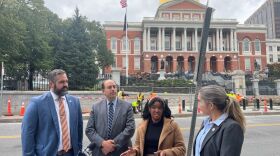Millions of dollars in ads to oppose what had been a low-profile Massachusetts ballot question are arriving just in time for vote-by-mail to begin. Ballot Question 3 looks to reform the state's liquor license laws by increasing the number of alcohol licenses a chain can hold, banning self-checkout of alcohol, and changing how stores are fined — like when they sell to underage customers.
The ballot campaign had been shaping up to be a one-sided affair, but not anymore. Matt Murphy of the State House News Service explains what happened.
Matt Murphy, SHNS: Well, this ballot question is being put forward by basically the package store owners — the small independent liquor, beer and wine retailers. And they floated this proposal as a compromise of sorts with the bigger chains — the food stores, the places like Cumberland Farms — who have been trying to lift the cap on the number of liquor licenses in the state that they can hold, so they can sell alcohol at more of their retail locations.
But as this ballot campaign has unfolded, those big stores like Cumberland Farms basically threw up their hands and said [they're] not going to fight this. A lot of the members in their coalition, some liked some of the provisions that the package store owners have put forward, particularly that it will double the number of licenses that any one retail chain can hold to sell beer and wine, from a 9 to 18, over a period of years. And some oppose some of the other provisions, particularly some restructuring to fines and other changes.
But they were not going to fight it — that is, until in early October we've seen new reports with the Office of Campaign and Political Finance that Total Wine and More is fighting it on their own, spending over $2 million on ads so far to oppose this. And this is probably because, while they do operate some stores in Massachusetts, they would lose [some] ability to sell all-alcohol. The number of [those] licenses would decline from 9 to 7 to sell beer, wine and spirits. And they are pushing back.
Carrie Healy, NEPM: Well, with mail in balloting getting underway on the 22nd is now too late to sway voters minds on this alcohol licensing issue?
No. I mean, probably not. A lot of these ballot questions are fairly complicated. And, you know, just like with candidates, when voters decide at the last minute, I think people are going to start to read these voter brochures, they're going to start to try and say, "Hey, OK, my ballot's here, I got to make up my mind. I got to understand what this does."
And I think, you know, a lot of the campaigns think that now is really a good time to start getting in front of voters and getting their message out, because this is when a lot of decisions are going to be made.
Last week, a report from the state auditor said there's more than $1.2 billion gap in state aid for school transportation, education, veterans benefits and other services — the funding for existing mandated programs. Now, I know that for years, rural western Massachusetts lawmakers have pointed to the underfunding of school transportation. And clearly much of this can't be new to elected officials. So, what do we expect to come of this information, from the Legislature or from the governor?
Yeah, it's certainly not new, and this report from the auditor is something that her office, the Division of Local Mandates, is required to produce every year. And they look at all the mandates that state government puts on cities and towns and whether or not they're being properly funded. And there is usually a gap there.
Certainly this $1.2-plus billion gap jumps off the page. It's certainly a lot of money. But as you noted, we've heard cities and towns for years talk about underfunding of special education, underfunding of school transportation and other programs in their cities and towns. This is certainly something that the Legislature says that they understand, and they try to make progress on every year.
There are incremental increases in the budget every year, but it's usually not enough, according to the cities and towns. And I think what we're going to see is this play out, particularly if Question 1, the so-called millionaire's tax, passes in November, makes additional money available for education, transportation and needs like that, I think we're going to see a big debate over how this money gets spent. And reports like these could help guide that and shape that discussion.
Speaking of those reports, state auditor Suzanne Bump, who has held that post for 12 years, is not running in this election. Has there been any comment on this report from the two major party contenders, Diana DiZoglio and Anthony Amore?
I haven't heard them specifically address this report. But I think in both of them, you have people out there talking about really holding the Legislature and state government as a whole, holding them to their commitments and holding their feet to the fire on a number of issues.
We know that Sen. DiZoglio from her time in the House and Senate has been vocal in her criticism of some of the decisions that the Legislature has made. I don't think if she were to be elected, she would shy away from calling out legislative leaders that they were failing to meet these mandates, as that office continues to produce these reports.
And the same goes for Anthony Amore, a Republican who's promising to bring balance to Beacon Hill and serve as a check. So, I think this is certainly something that no matter who wins that auditor race, this will continue to be an active issue for them.






